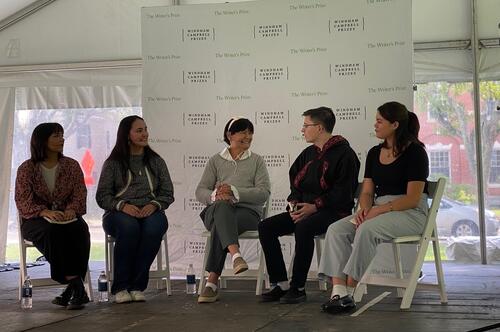NACC Students Interview Windham-Campbell Winner dg nanouk okpik

“Take what you need and leave the rest along the way for those who need it,” poet dg nanouk okpik (Inupiaq-Inuit) advises the audience crowded into an open-air tent on Yale’s central campus; her words of wisdom offered in response to a question from Nyche Andrew about how education had shaped the poet’s life. In a wide-ranging conversation that traveled from Alaska to New Mexico to Australia, from the future to the present to 93 million years ago, and from quantum mechanics to semiotics, four NACC students—Sunni Parisien (Pauli Murray, ’25), Kyle VanHatten (Pierson ‘25), Nyche Andrew (Branford ‘25), and Lex Schultz (Saybrook ‘24)—interviewed okpik as part of the four-day program for the Windham-Campbell Prize Festival.
The prestigious Windham-Campbell prize is awarded annually to two people in each of the following categories: poetry, drama, nonfiction, and fiction. Since its inaugural award ceremony in 2013 the Windham-Campbell prize has recognized an international cohort of outstanding writers and artists whose work has shaped the contours and trajectories of the written word across the globe. dg is the first Iñupiaq person and, indeed, the first Indigenous person from North America to be honored in any category. Many people from across campus felt the importance of her nomination and award—especially students at the NACC and those of us in the YGSNA community more broadly.
After Sunni introduced their fellow interlocutors, Nyche opened the Q and A session with a joke that also cut the heart of how significant dg’s presence on campus was that week. She said, “the last time there were two Inuit people on campus was when my sister was visited.” She thanked dg for being her sister for the week. The cutting, emotional, and satirically funny introduction set the tone for the rest of the conversation where dg answered questions about her experience as a transracial adoptee, her poetic practice, and her approach to life. Each question so carefully crafted by NACC students led dg down wandering roads of storytelling.
In response to Lex’s question about their shared experience as a transracial adoptee, dg told us about the time she hiked up a Montana mountain in the early, early morning to go snowboarding (a skill she learned from a group of Kanaka Maoli, or Native Hawaiian peoples) and got into an accident, crashing into a Ponderosa pine where she says her “teeth are still in that tree today.” It was this accident, in part, that led dg to her birthmother in a hospital in Alaska. Bridging from the humorous to the serious in nearly every response, dg gathered the audience around her commitment to understanding the world as a network of relatives. Replying to Kyle’s question about how humans and other-than-humans have influenced her life and writing, dg explained to us that we are all inescapably linked by the “four basic elements: hydrogen, carbon, nitrogen, and oxygen,” taking us across a fossil record that is in part real, in part imagined, and in part embedded in her poetic works to think about deep time. What does it mean to be in relation with a rock that is 93 million years old?
As the conversation came to close, dg reminded us that everything “is okay,” that we are okay, and that we share molecular bonds with one another and the world around us. Prompted by Sunni’s questions about how dreaming can be a way of receiving poetry, dg vociferously agreed, reminding us that dreams ask us to encounter the “mortal grossness” of life, but also offer a way to make feelings understandable. This is what she aspires to in her poetry—to be a “conduit of a hollow bone” that brings us all back to the sensory experiences of what it means to be a human and a relative.